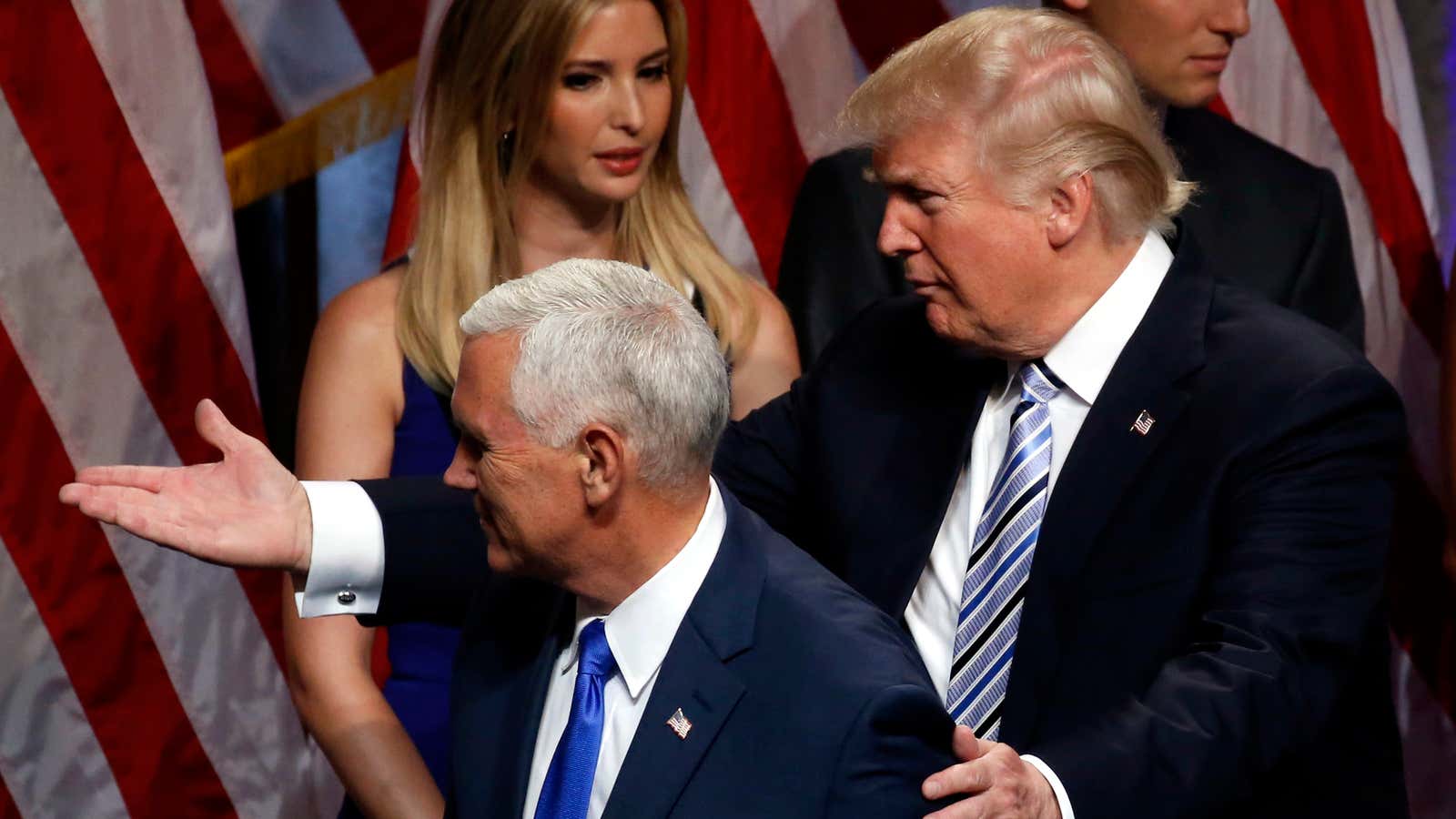After months of telling voters he’s a Republican, not a conservative, Donald Trump is tacking right on the eve of a gathering in Cleveland which will re-introduce his party to the public before this fall’s presidential vote.
In choosing vice-presidential nominee Mike Pence and the speakers studding his convention, Donald Trump says he is emphasizing “party unity”—which, as the four-day event kicks off, appears to includes Christian conservatism, far-right conspiracy theories and attacks on his rival Hillary Clinton. With former primary rivals like Republican scion Jeb Bush still attacking him openly, it may be the only way to tamp down infighting.
Pence, a former congressman turned Indiana governor, is best known for backing government shutdowns and an extreme anti-abortion law in his home state. With the tap, Trump is echoing the 2012 GOP standard bearer Mitt Romney, another businessman who chose a stalwart conservative from the party’s congressional team, the current Speaker of the House Paul Ryan, before being defeated.
President Obama, considered a liberal senator, chose the more centrist Joe Biden to balance his ticket in 2008. Clinton has yet to tap a running mate but her shortlist includes, alongside progressive senator Elizabeth Warren, a centrist Virginia senator, Tim Kaine, and a retired Navy Admiral, James Stavridis.
Conventional wisdom suggests candidates should tack to the middle as the US public begins to consider the general election in November. Romney’s gathering aimed to present him as an affable leader as well as an efficient businessman, and included a rainbow of Republican politicians, including Hispanic and African-American elected officials.
But few of the trappings of centrism appear present at the 2016 edition; many Republican politicians who represent states with moderate electorates are choosing to simply skip the convention. In their place are conservative celebrities like television actor Scott Baio, former Navy SEAL Marcus Luttrell and NRA lobbyist Chris Cox.
Monday’s convention schedule is still being assembled, but appears to focus on national security, with one speaker likely to be retired Lt. General Michael Flynn, who was considered as a possible VP but will instead be called on to discuss his thesis that Islamist terrorists are allying with Russia, Cuba and North Korea against the US and the need for US ground troops in Syria.
Early reports suggest Monday’s speakers intend to highlight the Benghazi attacks. Conservatives see the 2012 assault on a thinly-defended US consulate in Libya as an indictment of Clinton, who was then secretary of State, but at least eight different investigations, including two controlled by Republicans, found no evidence of her wrongdoing. We can expect to hear further about Clinton’s embarrassing but ultimately inconsequential e-mail mistakes while at the State Department.
Trump’s late-breaking move at party unity may be necessary to tamp down mutterings among true-blue conservatives who don’t cotton to Trump, whose populist nativism has rubbed stalwarts of the party’s free market approach the wrong way as well as alienating minorities and women in the Republican ranks. The schedule suggests Trump’s team sees no plausible path to victory beyond an historically unprecedented turnout of conservative voters.
The risk, however, is that he will miss a chance to present himself as a national candidate with broad appeal. Though both he and Clinton are viewed unfavorably by a majority of voters, three national polls released ahead of the convention by CNN (pdf), NBC and the Wall Street Journal, and ABC and the Washington Post, all show Clinton with single digit leads over Trump.
These polls will provide a better indicator after the the next two weeks, once first Trump and then Clinton accept their party’s nominations and position themselves to campaign through election day.
